CERCLE DIPLOMATIQUE - issue 03/2023
CD is an independent and impartial magazine and is the medium of communication between foreign representatives of international and UN-organisations based in Vienna and the Austrian political classes, business, culture and tourism. CD features up-to-date information about and for the diplomatic corps, international organisations, society, politics, business, tourism, fashion and culture. Furthermore CD introduces the new ambassadors in Austria and informs about designations, awards and top-events. Interviews with leading personalities, country reports from all over the world and the presentation of Austria as a host country complement the wide range oft he magazine.
CD is an independent and impartial magazine and is the medium of communication between foreign representatives of international and UN-organisations based in Vienna and the Austrian political classes, business, culture and tourism. CD features up-to-date information about and for the diplomatic corps, international organisations, society, politics, business, tourism, fashion and culture. Furthermore CD introduces the new ambassadors in Austria and informs about designations, awards and top-events. Interviews with leading personalities, country reports from all over the world and the presentation of Austria as a host country complement the wide range oft he magazine.
You also want an ePaper? Increase the reach of your titles
YUMPU automatically turns print PDFs into web optimized ePapers that Google loves.
LE MONDE COMMENTARY<br />
Austria’s security policy – a guide<br />
Austria’s security policy framework in three key points.<br />
Text: Walter Feichtinger<br />
You can watch Walter Feichtinger‘s videos on:<br />
cercle-diplomatique.com<br />
Walter Feichtinger<br />
graduated from the<br />
Theresian Military Academy<br />
in 1979, was in command of<br />
Panzer Battalion 10 and<br />
received his doctorate in<br />
political science from the<br />
University of Vienna in<br />
2002. From 2001 on, he was<br />
security and defence policy<br />
advisor in the Federal<br />
Chancellery, Secretary<br />
General of the Austrian<br />
Officers Association and<br />
most recently head of the<br />
Institute for Peacekeeping<br />
and Conflict Management.<br />
The retired Brigadier now<br />
runs the Center for Strategic<br />
Analysis (CSA) in Vienna<br />
with a team, founded in<br />
2008 as an informal<br />
platform for topics of<br />
geopolitical and security<br />
policy relevance.<br />
csa-austria.eu<br />
The participation in the European Sky Shield<br />
Initiative (ESSI, see article on page 46) has inevitably<br />
sparked a heated debate among political<br />
parties in Austria, questioning whether it is permissible<br />
due to the country’s “everlasting neutrality”.<br />
The Russian invasion of Ukraine in February 2022 already<br />
caused significant uncertainty about the stance<br />
Austria should take and how it should behave on specific<br />
<strong>issue</strong>s, such as the transit of weapons.<br />
Even for a seasoned Austrian, it is not always easy<br />
to follow these discussions and discern the actual cornerstones<br />
of Austrian security policy. Positions oscillate<br />
between isolationist neutrality and a pro-western,<br />
liberal-oriented active engagement in international<br />
affairs.<br />
The three pillars of Austrian security policy<br />
So, what are the pillars of Austria’s security and defence<br />
policy that serve as pointers for orientation? The<br />
automatic answer to this question is often “our neutrality”.<br />
Neutrality represents security, defence, reputation,<br />
image, and national identity. However, this view<br />
falls short of encompassing the whole picture. When<br />
the Neutrality Act was passed on October 26, 1955,<br />
the then Federal Government emphasised that Austria<br />
aligns itself with the Western world, embracing liberal<br />
and democratic values.<br />
Taking a comprehensive view, the following three<br />
characteristics can be identified in Austrian security<br />
policy: neutrality as the “foundation” of security and<br />
defence policy, a striving for a special status as a mediator<br />
in international conflicts and a provider of good<br />
offices (“bridge builder”), and Austria’s membership<br />
and participation in international organizations to<br />
preserve or restore peace and security.<br />
Neutrality at the core<br />
Undoubtedly, neutrality stands as the central feature.<br />
However, not in the Swiss model, but rather in<br />
the unique “Austrian way”. This means that from the<br />
outset, more emphasis was placed on diplomatic engagements<br />
than defence efforts. Austria joined the<br />
UN at the end of 1955. In the following year, it welcomed<br />
hundreds of thousands of Hungarian refugees<br />
fleeing from Soviet troops. Over time, Austria’s neutrality<br />
was modified and adapted to real needs. Joining<br />
the EU in 1995, in particular, demanded political flexibility<br />
to avoid potential conflicts between the status<br />
of neutrality and the rights and obligations as an EU<br />
member. Thus, a constitutional amendment was<br />
made, de facto suspending neutrality in the realm of<br />
the Common Foreign and Security Policy (CFSP).<br />
The simple political formula became: “solidarity<br />
within the EU, neutrality outside the EU”. However, in<br />
practice, this can be challenging as most foreign policy<br />
decisions are made within the EU framework. This is,<br />
therefore, often referred to as “residual neutrality”. As<br />
such, Austria may not engage in any war, join any military<br />
alliance, or tolerate the permanent stationing of<br />
foreign troops on its territory.<br />
Austria’s special status<br />
A second characteristic is Austria’s aspired special<br />
status as a neutral conflict mediator and provider of<br />
good offices. Undoubtedly, during the Cold War, Austria<br />
achieved success in this area, gaining a reputation.<br />
Examples include the meeting between US President<br />
John F. Kennedy and Soviet Premier Nikita Khrushchev<br />
in 1961, as well as mediation efforts by former<br />
Chancellor Bruno Kreisky in the Middle East conflict<br />
in the 1980s. Crucially, Vienna became the headquarters<br />
for significant international organisations such as<br />
the UN, the OSCE, or OPEC.<br />
However, with Austria’s EU accession in 1995 and<br />
the rapid pace of globalisation, the opportunities to<br />
present itself as a negotiation venue and dealmaker<br />
have diminished significantly. Even the recent talks on<br />
the Iranian nuclear programme cannot conceal this<br />
fact. Many emerging countries in other regions of the<br />
world have gained importance and are now offering<br />
themselves as locations for negotiations, like Singapore,<br />
for instance. So far, Vienna has managed to hold its<br />
ground, but the current prevailing geopolitical power<br />
struggles, the restriction of arms control measures,<br />
and the marginalisation of security organisations like<br />
the OSCE are significantly limiting the possibilities for<br />
conflict mediation and trust-building efforts.<br />
Austria’s ambition to maintain a special status as a<br />
neutral country has become more challenging in the<br />
face of this turning point. Nevertheless, Austria continues<br />
to enjoy an excellent reputation as a host for international<br />
organizations, which it strives to uphold.<br />
PHOTOS: BEIGESTELLT<br />
tion to being a member of the UN, Austria has also<br />
joined the OSCE, the EU, and the NATO Partnership<br />
for Peace (PfP). Within these frameworks, numerous<br />
special envoys or high representatives have provided<br />
valuable services. Civil and military peace operations<br />
have also been carried out under the auspices of the<br />
UN, EU, OSCE, and NATO PfP. For many years, UN<br />
missions dominated, with the first troops deployed in<br />
the Congo as early as 1960. However, after joining the<br />
EU and the NATO PfP in 1995, the focus of Austrian<br />
deployments shifted to neighbouring regions, specifically<br />
Bosnia and Herzegovina, as well as Kosovo. Austria<br />
has even committed to permanently providing a<br />
specific contingent for international peacekeeping<br />
missions. Through this engagement, Austria makes a<br />
solidary contribution to international peace and security,<br />
which, in turn, is expected to have a positive impact<br />
on its own security situation.<br />
However, for its immediate defence, Austria is solely<br />
responsible. It cannot rely on NATO’s protection,<br />
as participating in a collective defence would contradict<br />
the Neutrality Act. Within the EU framework,<br />
Austria, along with Ireland, Malta, and Cyprus, claims<br />
an exception for itself regarding mutual defence obligations<br />
(“Irish clause”). Consequently, it remains<br />
uncertain to what extent other EU members would<br />
provide Austria with military assistance.<br />
The future of Austrian security policy<br />
For over 20 years, Austria has emphasised that the<br />
EU forms its most crucial security framework. Despite<br />
Finland’s existing NATO membership and Sweden’s<br />
foreseeable accession, Austria continues to adhere to<br />
this position. Together with Ireland, Malta, and Cyprus,<br />
it belongs to the small group of alliance-free/neutral<br />
EU full members. Realistically speaking, NATO<br />
membership while abandoning neutrality is not considered<br />
an option. The strong insistence of major political<br />
parties, deep public support, and limited efforts<br />
to engage in a well-founded, rational discourse on the<br />
benefits and risks of neutrality make it difficult to reconsider<br />
this stance.<br />
After initial hesitation and pressure from experts,<br />
the government is now revising Austria’s central planning<br />
document, the Austrian Security Strategy (ÖSS)<br />
from 2013. However, this revision is conducted under<br />
the condition not to tamper with the status of neutrality.<br />
An initial result is expected by the end of <strong>2023</strong>,<br />
Membership in and contributions to international organisations<br />
Last but not least, Austria’s contribution to international<br />
peace efforts should also be mentioned. In addipotentially<br />
influencing this government’s term.<br />
Yet, the overarching question remains how Austria’s<br />
security can best be ensured. The participation in Sky<br />
Shield demonstrates that Austria does not pursue an<br />
isolationist security policy but is aware of the necessity<br />
of international cooperation. However, it will not be<br />
easy to navigate the changing geopolitical conditions<br />
while maintaining the balance between perpetual neutrality<br />
and defence policy necessities.<br />
Federal Law Gazette of<br />
4 November 1955:<br />
Federal Constitutional<br />
Act of 26 October 1955<br />
on the Neutrality of Austria.<br />
58 Cercle Diplomatique 3/<strong>2023</strong><br />
Cercle Diplomatique 3/<strong>2023</strong><br />
59
















